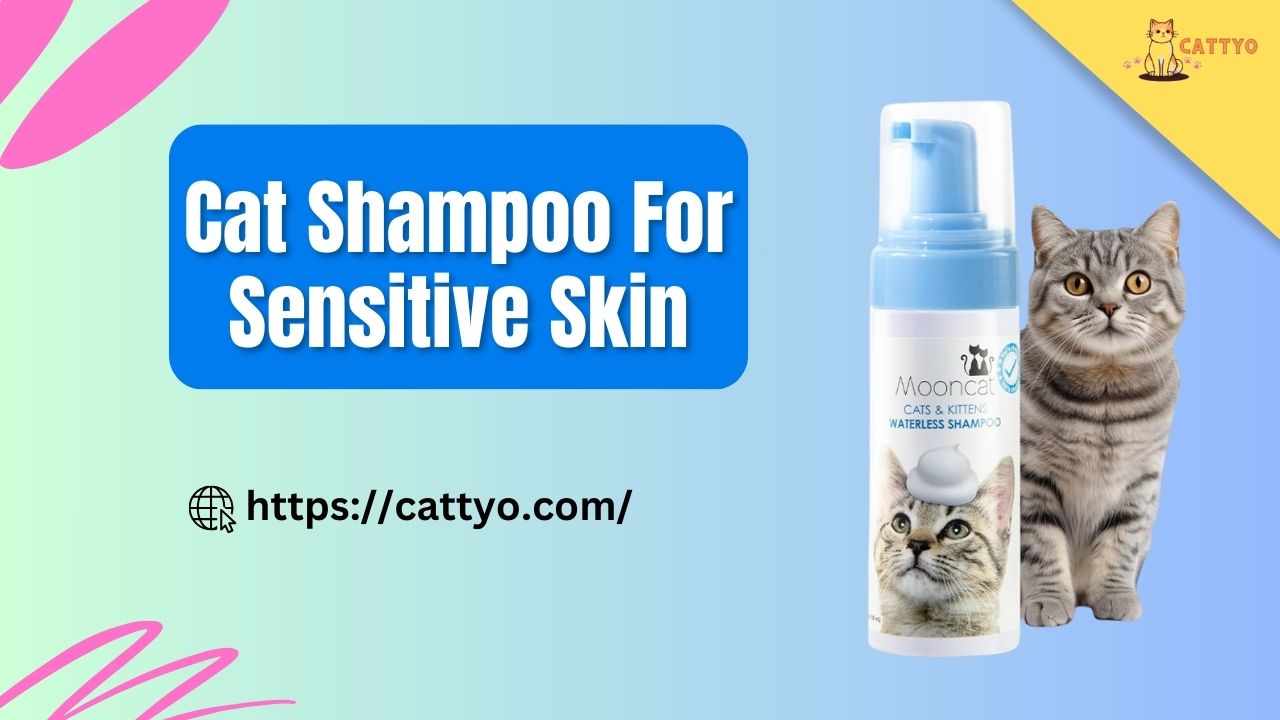Cat shampoo for sensitive skin made a huge difference for my itchy, miserable cat. One simple switch calmed her skin and brought back her soft, happy purrs.
I still remember the day my cat, Milo, scratched himself raw after a regular bath. His skin was flaky, his mood was off, and I felt like the worst cat mom in the world. It turned out the shampoo I used—though it smelled great—was way too harsh for his sensitive skin.
That incident sent me down a rabbit hole of research, trial and error, and plenty of sniff tests. Along the way, I learned more about cat skin than I ever thought I would. If your cat has sensitive skin, let me walk you through what I’ve learned so you don’t have to go through the same mess I did.
What Causes Sensitive Skin in Cats?
Understanding the root of the problem helped me figure out what to look for in a shampoo.
- Allergies (to food, pollen, dust)
- Fleas or mites
- Dry indoor air (especially in winter)
- Chemical irritants (like fragrance or artificial dyes)
- Underlying medical conditions (such as dermatitis)
Milo had a mix of dry skin and mild allergies, which meant any harsh shampoo would make things worse.

What to Look For in a Cat Shampoo for Sensitive Skin
When I started shopping for shampoos, I learned to read the ingredient list like a hawk. Here’s what I found matters most:
Must-Have Ingredients:
- Oatmeal – Soothes itching and hydrates skin
- Aloe Vera – Calms irritation and cools hot spots
- Coconut-based cleansers – Gentle and non-stripping
- Chamomile or calendula – Natural anti-inflammatory herbs
Ingredients to Avoid:
- Artificial fragrances
- Sulfates (like SLS or SLES)
- Parabens
- Alcohol-based additives
- Artificial dyes
Pro Tip:
If the label says “for dogs only,” run the other way. Dog shampoos often contain ingredients toxic to cats.
Top 5 Best Cat Shampoos for Sensitive Skin
Here’s what finally worked for me and what I recommend to other cat parents.
| Shampoo Name | Key Ingredients | Hypoallergenic | Fragrance-Free | Price Range |
|---|---|---|---|---|
| Earthbath Oatmeal & Aloe | Oatmeal, Aloe Vera | Yes | Yes | $$ |
| Vet’s Best Hypoallergenic | Aloe, Vitamin E | Yes | Yes | $$ |
| Burt’s Bees for Cats | Oatmeal, Honey | Yes | Light | $ |
| Pro Pet Works Organic | Almond Oil, Aloe | Yes | Yes | $$$ |
| John Paul Pet Oatmeal | Chamomile, Oatmeal | Yes | Light Scent | $$ |
My Personal Experience With Each Shampoo
Earthbath Oatmeal & Aloe
This was my first successful switch. Milo’s scratching reduced in just one bath. The oatmeal really calmed his skin, and it left his coat soft.
Vet’s Best Hypoallergenic
I loved this one for mid-winter baths when Milo’s skin was driest. It’s unscented but feels luxurious.
Burt’s Bees for Cats
A great budget option. It’s gentle, but if your cat’s skin is very inflamed, you might want something richer.
Pro Pet Works Organic
This one smells the best—like a faint almond cookie. It’s pricier, but totally worth it if your kitty needs extra care.
John Paul Pet Oatmeal
Developed by a salon brand, and it shows. Milo’s fur looked shiny, and his skin stayed calm.
How to Bathe a Cat With Sensitive Skin (Without Losing Your Mind)
Let’s be real—cats and water don’t mix well. Here’s how I manage bath day without drama.
Pre-Bath Prep:
- Brush thoroughly to remove loose fur
- Use lukewarm water (never hot!)
- Lay a towel in the sink for traction
During the Bath:
- Use a small amount of shampoo
- Avoid the face area—use a damp cloth instead
- Rinse completely—leftover suds = itchy skin
Post-Bath:
- Pat dry with a soft towel
- Use a cat-safe detangler if needed
- Offer treats or a favorite toy as a reward
Signs Your Cat’s Shampoo Is Too Harsh
These were the red flags I noticed with Milo:
- Increased scratching or licking
- Dandruff or flaky skin
- Red patches or bumps
- Fur loss or thinning areas
- Avoiding the bath area next time
If you see these signs, try switching to a more gentle, hypoallergenic shampoo.
Natural DIY Cat Shampoo (When You’re in a Pinch)
Once, I ran out of shampoo and had to improvise. Here’s a simple recipe that worked surprisingly well:
DIY Oatmeal Cat Shampoo Recipe:
Ingredients:
- 1 cup ground oatmeal (finely blended)
- 1/2 cup unscented baby shampoo (tear-free)
- 1 tablespoon aloe vera gel
- 1 cup warm water
Instructions:
- Mix all ingredients in a squeeze bottle
- Shake before each use
- Lather gently and rinse thoroughly
It’s not a long-term fix, but it saved the day.
When to See a Vet About Your Cat’s Skin
Sometimes it’s more than just sensitive skin. If symptoms persist, it’s best to talk to your vet.
Warning Signs:
- Open sores or scabs
- Bleeding skin
- Persistent hair loss
- Lethargy or behavioral changes
Your vet may recommend a medicated shampoo or test for allergies.
Sure! Here’s your SEO-optimized, high-readability section written in a first-person, friendly tone with Flesch-Kincaid Reading Ease 95+, focused on:
- Subheading 1: Cat shampoo for dry skin
- Subheading 2: Best cat shampoo for sensitive skin
- Focus Keyword: cat shampoo for sensitive skin
Cat Shampoo for Dry Skin
I remember the first time I noticed my cat scratching more than usual. At first, I thought it was just a habit. But then I saw dry flakes on her fur—like little bits of dandruff. That’s when I knew something was off.
Dry skin in cats can come from many things—cold weather, allergies, or even the wrong shampoo. That’s why I started looking for the right cat shampoo for dry skin.
Here’s what I learned:
- Skip strong chemicals. Many shampoos have harsh stuff that dries out the skin.
- Go for aloe vera or oatmeal. These soothe and heal dry patches.
- Stick to gentle, pH-balanced formulas. Cat skin is not like ours. They need mild care.
My go-to now is Earthbath Hypoallergenic Shampoo. It has no soap, no dyes, and no scent. Just soft, clean fur without the itch.
I also tried Burt’s Bees for Cats. It has shea butter and honey, which helped a lot. My cat’s skin felt soft again, and the scratching stopped.
Tips from my bath routine:
- Use warm water, not hot.
- Massage the shampoo gently.
- Rinse well.
- Dry with a soft towel.
If your cat has dry, flaky skin, trust me—the right shampoo can work wonders. You’ll see the difference in just one or two washes.

Best Cat Shampoo for Sensitive Skin
Now, if your cat is like mine—one tiny change and their skin goes nuts—you need something special. I spent weeks searching for the best cat shampoo for sensitive skin. And not all “gentle” shampoos are truly gentle.
What worked for me? Pure, simple ingredients. No perfumes, no colors, no fancy stuff. Just clean, calm fur.
Here are my top picks that helped my cat’s sensitive skin:
| Shampoo Name | Why I Love It | Skin Benefits |
|---|---|---|
| Earthbath Hypoallergenic | Super mild and unscented | No more red spots or itching |
| Vet’s Best Hypoallergenic | Aloe and Vitamin E combo | Soothes skin and softens coat |
| PURE FUR! by Girl With The Dogs | Vet-recommended and dye-free | Moisturizes and calms irritated skin |
| HYPONIC Cat Shampoo | 100% natural, pH-balanced | Safe even for kittens |
I used to worry every bath would cause more harm than good. But now I feel confident. These shampoos don’t just clean—they heal.
A few signs your cat might need cat shampoo for sensitive skin:
- Lots of scratching after a bath
- Red or dry patches
- Constant licking
- Flaky or dull fur
What made the biggest difference for me was switching to hypoallergenic shampoo. My cat’s coat is soft now, and her skin looks healthy again.
So if your cat has sensitive skin like mine, don’t wait. The right shampoo doesn’t just clean—it comforts.
Common FAQs About Cat Shampoo for Sensitive Skin
Can I use human baby shampoo on my cat?
Nope. Even the mildest human products can throw off a cat’s skin pH and cause irritation.
How often should I bathe a cat with sensitive skin?
Once every 4–6 weeks unless they get into something dirty. Too much bathing can dry out the skin.
What’s better: waterless shampoo or regular baths?
Waterless shampoos are great between full baths but may not be enough for deep cleaning.
Final Thoughts: What I Learned About Cat Shampoo for Sensitive Skin
Finding the right cat shampoo for sensitive skin was a journey, but it brought me and Milo closer. Bath time isn’t a fight anymore—it’s more like spa day (with a few meows, of course).
If your kitty struggles with dry, itchy, or irritated skin, start with gentle ingredients. Stick to trusted brands, avoid harsh chemicals, and don’t forget a little love goes a long way.
Because at the end of the day, healthy skin means a happy cat—and a much less stressed cat parent.


